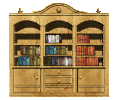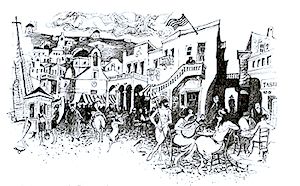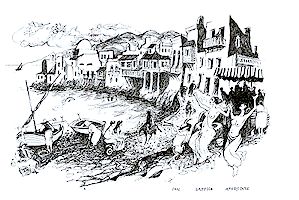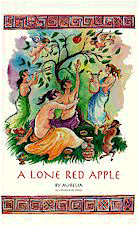
By AURELIA, Illustrated by Bill Papas
 EXCERPT FROM "A LONE RED APPLE"
EXCERPT FROM "A LONE RED APPLE" It is late Saturday evening when Elena begins to prepare herself. She tingles with anticipation. This will be a Mykonos night. Carefully selecting what she will wear, combing her hair over and over again, applying and re-applying makeup, and turning and spinning before her full-length mirror, Elena is in a happy state of frenzy.
Just before midnight she leaves her apartment, walking slowly through town to the Mykonos Bar. She weaves through the crowds in the narrow, cobblestone streets, experiencing the sensation of walking through a raucous, evening street festival. Diners are still lingering in the tavernas where they are entertained by skilled local musicians performing folk songs. Many of these men spent their lives perfecting their artistry and are very proud that they are preserving their cultural traditions through folk songs. Soon, the diners now enjoying the songs will pack into the discos and Greek nightclubs where the music is loud and blaring.
 Grills are placed outside the tavernas in the evenings and meats, fish and vegetables are prepared over hot flames as tourists walk by, tempted by the delicacies. Elena loves Mykonos at night and its night-time scents. Seared lamb. Expensive perfume. Cigarette smoke. Scented candles. Sweet wine. Marijuana. Roasted eggplant. Marijuana. Around the next corner, Elena reaches The Mykonos Bar. It is spirited. DJ's are playing modern Greek music and soon live musicians will replace the DJ's and play Rhembetiko and other songs. She remembers reading in Athens that it is only the Greeks and the Spaniards who still listen to their own music consistently, and this makes her feel proud.
Grills are placed outside the tavernas in the evenings and meats, fish and vegetables are prepared over hot flames as tourists walk by, tempted by the delicacies. Elena loves Mykonos at night and its night-time scents. Seared lamb. Expensive perfume. Cigarette smoke. Scented candles. Sweet wine. Marijuana. Roasted eggplant. Marijuana. Around the next corner, Elena reaches The Mykonos Bar. It is spirited. DJ's are playing modern Greek music and soon live musicians will replace the DJ's and play Rhembetiko and other songs. She remembers reading in Athens that it is only the Greeks and the Spaniards who still listen to their own music consistently, and this makes her feel proud. Flowers are strewn on the dance floor, and balloons that escaped pinpricks float to the ceiling. There are no broken plates as yet; the night is still young. Elena moves about freely, sitting awhile with friends, then dancing, and at times just standing quietly by herself, observing the crowd. She is a favorite partner of the regulars who frequent the bar so she has a partner most of the night, except when the men dance arm-over-arm by themselves.
Elena is energized by the music, the atmosphere, and the magic of Mykonos at night. She plans these nights deliberately and spaces them weeks apart, because for her they are too delicious-like having too much candy. She thinks she could live to dance. When the night slips into morning, the energy is still high and the dancing is more robust. Musicians and dancers alike pride themselves on their abilities to sustain their energy, and this seems to be a point of pride in the Mykonos Bar.
Elena is dancing with a group, but when the tempo of the tsifte teli increases, she climbs onto the bar and dances solo, as graceful as a poem. Applause from the crowd and flowers thrown in appreciation of her agility encourage her, and she stays above the crowd, moving seductively. As the musicians bring the evening to a close, plates are broken on the floor and bottles of champagne are popped and squirted on Elena. Laughing, she dances to the end of the bar where her friends take her by the hands and lift her down.
Matthew rises early that Sunday morning and takes the first bus into town. He enjoys solitary walks in Hora on a Sunday morning when all is peaceful and calm; he likes to walk by the churches and hear the cantors. Heading for the secluded Alefkandra quarter, he quickens his pace. In a cove behind the town, rows of old homes with overhanging balconies are lapped by the sea, just as they have been for hundreds of years. He sits alone at a closed taverna and listens to the rhythm of the waves and the cantors singing from a nearby church. Called "Little Venice," the Alefkandra quarter is one of the most romantic spots in Mykonos and its beauty has been captured by artists and photographers from all over the world.
Matthew decides to stroll to the center of town and makes his way slowly as the churches begin to release their congregations. There are hundreds of churches on the small island, and services begin at different times, some as early as 5:30 a.m. The clubs, on the other hand, remain open all night and close in the early morning hours. On Sunday mornings, worshipers returning to their homes share the streets with night people who have recently left the clubs and discos. Widows, wearing traditional black dresses and head scarves pass young women scantily attired; each group stares in amazement at the other, saving their caustic comments for when they are safely out of ear-shot.
Men and women selling produce from their donkeys stand near young rent boys trying to make one more score before the "night" ends. Music from a near-by club is now playing softly, perhaps in deference to hundreds of church bells tolling all over the island. Matthew turns into a narrow street and passes an icon maker opening early. His walls are decorated with magnificent works of art in the Byzantine style, each an original. On his easel in the center of his studio is an almost completed icon of St. George and the Dragon. When he begins to paint, he will encourage people to watch as he executes his centuries-old craft; he will also explain some techniques. A few doors down another shop owner is preparing to open. He sells hand-made leather handbags and sandals, but has a selection of other leather products-harnesses, vests, gloves, whips-for the gay crowd.
Matthew hears the swishing of skirts as he rounds the corner and comes almost face to face with two tipsy drag queens, one with orange-colored hair who is wearing a long purple gown and another purple-haired queen in a billowing orange gown. Walking gingerly on stiletto heels, they flirt with him and giggle as they pass, calling him "honey" and "child." He has almost reached his favorite coffee shop when he hears the swishing sound again and turns to see two orthodox priests walking behind him, their long black robes draped with jeweled crosses; the robes dust the cobblestones.
 The men are very old, their shoulder-length hair and beards are snow white. On their heads, tall klimafyia sit like crowns. The restaurant is not yet open, but Matthew sees a group of young men standing there. As he comes closer, he notices a familiar face in the center of the circle and recognizes the man as a famous fashion designer. He cannot remember his name. The man is surrounded by his acolytes-beautifully attired, handsome young men. They are standing near long tables that have been pushed together; many candles recently extinguished are on the table and wisps of smoke curl around the squat molds. Wax has dripped onto the white cloth and the scent of incense, jasmine and rosemary is in the air.
The men are very old, their shoulder-length hair and beards are snow white. On their heads, tall klimafyia sit like crowns. The restaurant is not yet open, but Matthew sees a group of young men standing there. As he comes closer, he notices a familiar face in the center of the circle and recognizes the man as a famous fashion designer. He cannot remember his name. The man is surrounded by his acolytes-beautifully attired, handsome young men. They are standing near long tables that have been pushed together; many candles recently extinguished are on the table and wisps of smoke curl around the squat molds. Wax has dripped onto the white cloth and the scent of incense, jasmine and rosemary is in the air. Matthew has seen the designer here before. He speculates that this must be a favorite spot for him and his boys to watch the crowd and he guesses (correctly) that they probably start the evening here and then come back in the morning for coffee. Deciding he will pass on the coffee, Matthew takes a left turn to buy a paper before returning to his apartment. Incense is heavy in the air as he passes another church; he looks in to see candles being extinguished as altar cloths are carefully folded and tucked away until next week's service.
People have gathered at the newsstand to wait for the first boat to arrive from Athens with the morning papers. Matthew sees the boat in the horizon; it will dock shortly. He goes into the bakery for a cheese pie and a coffee and hears local women talking about last night's revelries. News travels fast on Mykonos. "And she was in the taverna all night!! Dancing on the bar!! It was shameless. All night she was there, dancing on the bar!!" "Ah, someone had herself a Mykonos night," Matthew says to himself as he prepares to find the bus for the ride back.
--From A Lone Red Apple, by Aurelia, Bill Papas(Illustrator). © June 1998 , Aurelia, Bill Papas (Illustrator).


A perfect read on your trip to Greece, or just for a great get-away. Click here to BUY THE BOOK.


You are to me a lone red apple,
high atop the tallest tree.
Some say all who came
passed it by; I say none
could reach that high.
- Sappho
..."Let's continue the examination," Matthew says. "Why is it none could reach that high?"Some students say the apple represents perfection, others say unattainable desire.
"What else could the apple represent?" Matthew asks as he prods the students to think more deeply about this message. They answer:
"A high ideal."
"A solitary person."
"Someone elusive."
"A temptation."
"Someone who is untouched, is pure."
"And what is the name for someone who is untouched or pure?" Matthew asks.
"A virgin?" a student asks.
"Yes," Matthew says, "that is a possibility."
"What does the apple mean, then?" asks Brandon. "What did Sappho intend? Is it a high ideal, someone unattainable? A temptation? A solitary person, or a virgin?"
Dina asks, "Yes, what did Sappho intend?"
"I think whatever you see in the apple is what Sappho intended." Matthew responds. "Think more about this image," he encourages, "and we will discuss it further."...
...The class is over; the students walk along the beach to explore the island. Elena is on the far side, engrossed in her practice, but Matthew is now standing quietly and watching her. As she stretches, her fingers seem to touch the sky, and her body, clothed in white, becomes a sculpture that is one with the island.
"So that is poetry in motion," Matthew muses.
HOME l Travel Information l About the Author l Illustrations l Places in the Book l Characters
Reviews l More Reviews l Readers' Ratings l View The Book l Buy The Book